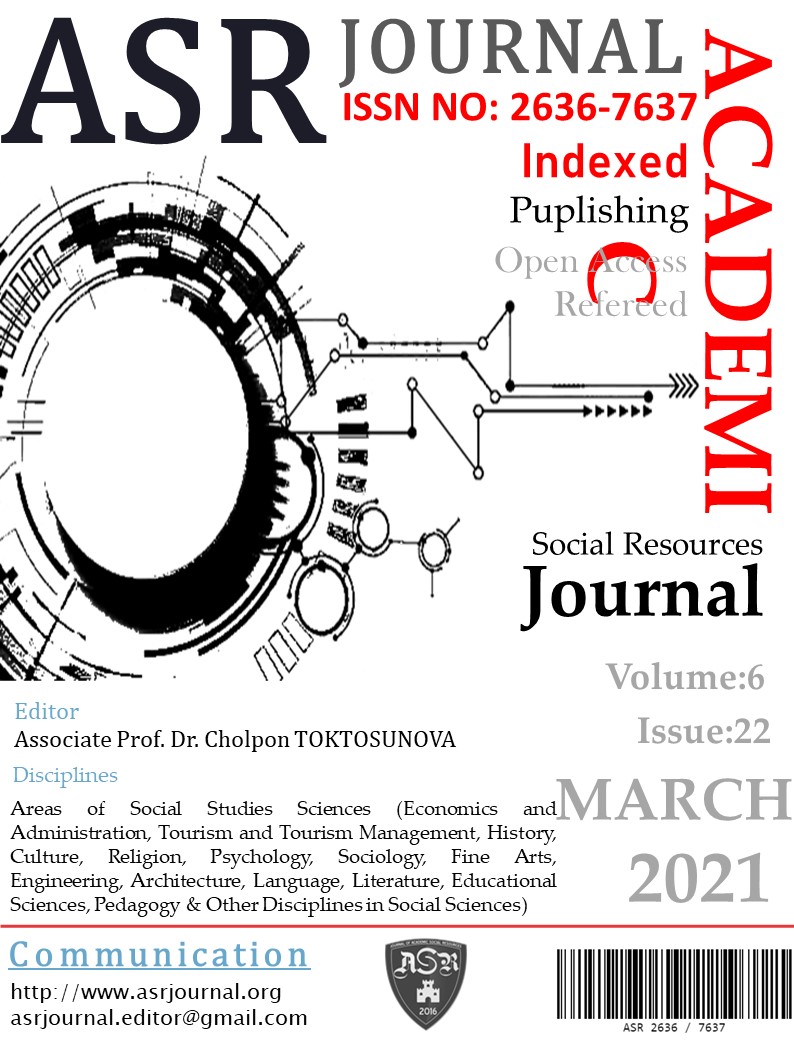Author :
Abstract
Sosyal bir sistem olan örgütler belirli bir amaç için bir araya gelmiş insanlardan oluşan ve belirli bir yapı içerisinde hareket eden organizasyon yapılarıdır. Örgüt içinde faaliyet gösteren insanlar bu ortak amaç doğrultusunda koordineli bir şekilde beraber çalışırlar. Bu amaçlara daha etkili ve verimli bir şekilde ulaşabilmek için belirli kurallara, normlara ve politikalara ihtiyaç vardır. Günümüzde örgütler her alanda yüksek derecede rekabetçi bir ortam içinde faaliyet göstermektedir. Hedeflere ulaşma hususunda sadece maddi unsurlarla sınırlı değillerdir. Örgütleri amaçlarına ulaştıracak asli unsur insan kaynağıdır. Çalışanının yaptığı işten aldığı doyumun niteliğini önemseyen örgütler rakiplerine göre öne çıkma şansı elde eder. Bugün birçok çalışma ortaya koymuştur ki, örgüt kültürünün, çalışanın algıları ve iş tatmini üzerinde önemli bir etkisi vardır. Bu nedenle, rekabet üstünlüğünü kaybetmek istemeyen örgütler, çalışan memnuniyetini aktif olarak teşvik eden bir örgütsel yapı yaratmalı, bu doğrultu da etkileşimli bir kültür inşa etmelidir. Yaratıcılığa, yeniliklere odaklanan ve çalışanıyla etkileşim içinde olan örgüt kültürleri iş memnuniyetini ve dolayısıyla iş performansını artırma eğilimindedir.
Keywords
Abstract
Organizations, which are a social system, are organizational structures consisting of people who come together for a specific purpose and act within a certain structure. People operating in the organization work together in a coordinated manner towards this common goal. Certain rules, norms and policies are needed to achieve these goals more effectively and efficiently. Today, organizations operate in a highly competitive environment in all areas. In achieving goals, they are not limited to financial factors. The main element that will help organizations achieve their goals is human resources. Organizations that care about the quality of the job satisfaction of their employees have the chance to stand out compared to their competitors. Today, many studies have revealed that organizational culture has a significant impact on employee perceptions and job satisfaction. For this reason, organizations that do not want to lose their competitive advantage should create an organizational structure that actively encourages employee satisfaction, and in this direction should build an interactive culture. Organizational cultures that focus on creativity, innovation and interact with their employees tend to increase job satisfaction and thus job performance.
Keywords
- Arnold, T. & Spell, S. C. (2006). “The Relationship between Justice and Benefits Satisfaction”, Journal of
- Arnold, T. & Spell, S. C. (2006). “The Relationship between Justice and Benefits Satisfaction”, Journal of Business and Psychology, 20(4): 599-620.
- Christen, M.; Iyer, G. & Soberman, D. (2006). “Job Satisfaction, Job Performance, and Effort: A Reexamination Using Agency Theory”, Journal of Marketing, Januaryr, 70: 137-150.
- Clark, A. E. (1997). “Job satisfaction and gender: Why are women so happy at work?”, Labour economics, 4(4): 341-372
- Corbin, L. J. (1977). “Productivity and job satisfaction in research and development: Associated individual and supervisory variables”, Airforce Institute of Technology, 3.
- Duncan, W. J. (1989). “Organizational culture: Getting a fix on an elusive concept”, The Academy of Management Executive, 3 (3): 229-236.
- Eren, E. (2010). Örgütsel Davranış ve Yönetim Psikolojisi, Beta Yayınları, İstanbul. Hofstede, G. (2001). Culture’s Consequences, Sage Publication, California.
- Jiang, J. J. & Klein G. (2000). “A discrepancy model of information system personnel turnover”, J Manage Inform Sys, 16 (3): 219-240.
- Kartarı, A. (2014). Kültür, Farklılık ve İletişim, İletişim Yayınları, İstanbul.
- Kline, T. J. B. & Boyd, J. E. (1994). “Organizational structure, context and climate: Their relationship to job satisfaction at three managerial levels”, Journal of General Psychology, 118(4): 305-316.
- Koustelios, A. & Kousteliou, I. (1998). “Relations among measures of job satisfaction, role conflict, and role ambiguity for a sample of Greek teachers”, Psychological Reports, 82: 131-136.
- Kroeber, A. L. & Kluckhohn C. (1952). Culture: A critical review of concepts and definitions, Greenwood Press, Connecticut.
- McKinnon, L. J.; Harrison, L. G.; Chow, W. C. & Wu, A. (2003). “Organizational culture: associationwith commitment, job satisfaction, propensity to remain and information sharing in Taiwan”, International Journal of Business Studies, 11(1): 25-44.
- Mozaffari A. F.; Pardakhtchi M. H; Yamani Douzi Sorkhabi M. & Zokaii M. (2008). “A Study ofRelationship between Organizational Culture and Leadership Styles in Iranian Institutes of Higher Education”, Quarterly Journal of Research and Planning in Higher Education, 14(1):133–157.
- Mulinge, M. M. (2000). “Toward an Explanation of Cross-Sector Differences in Job satisfaction andOrganizational Attachment Among Agricultural Technicians in Kenya”, African Sociological Review. 4(1): 55-73.
- Ogbonna, E. & L. C. Harris (2000). “Leadership style, organizational culture and performance: empirical evidence from UK companies”, International Journal of Human Resource Management, 11(4): 766-788.
- Pettigrew, A. (1979). “On Studying Organizational Cultures”, Administrative Science Quarterly, 24: 570- 581.
- Schein, E. H. (2004). Organizational Culture And Leadership, Jossey-Bass.
- Schneider, B. & Snyder, R. A. (1975). “Some relationship between job satisfaction and organizational climate”, Journal of Applied Psychology, 60(3): 318−328.
- Schneider, B. & Reichers, A. E. (1983). “On etiology of climates”, Personnel Psychology, 36: 19-37.Spector, P. E. (1997). Job satisfaction: Application, assessment, causes and consequences, Thousand Oaks, CA, Sage Publications, Inc
- Trompenaars, F. & C. Hampden-Turner (1998). Riding the Waves of Culture, Understanding Diversity in Global Business, 2th Edition, McGraw-Hill
- Tseng, Shu-Mei (2010). “The correlation between organizational culture and knowledge conversion on corporate performance”, Journal of Knowledge Management, 14 (2): 269-284.





